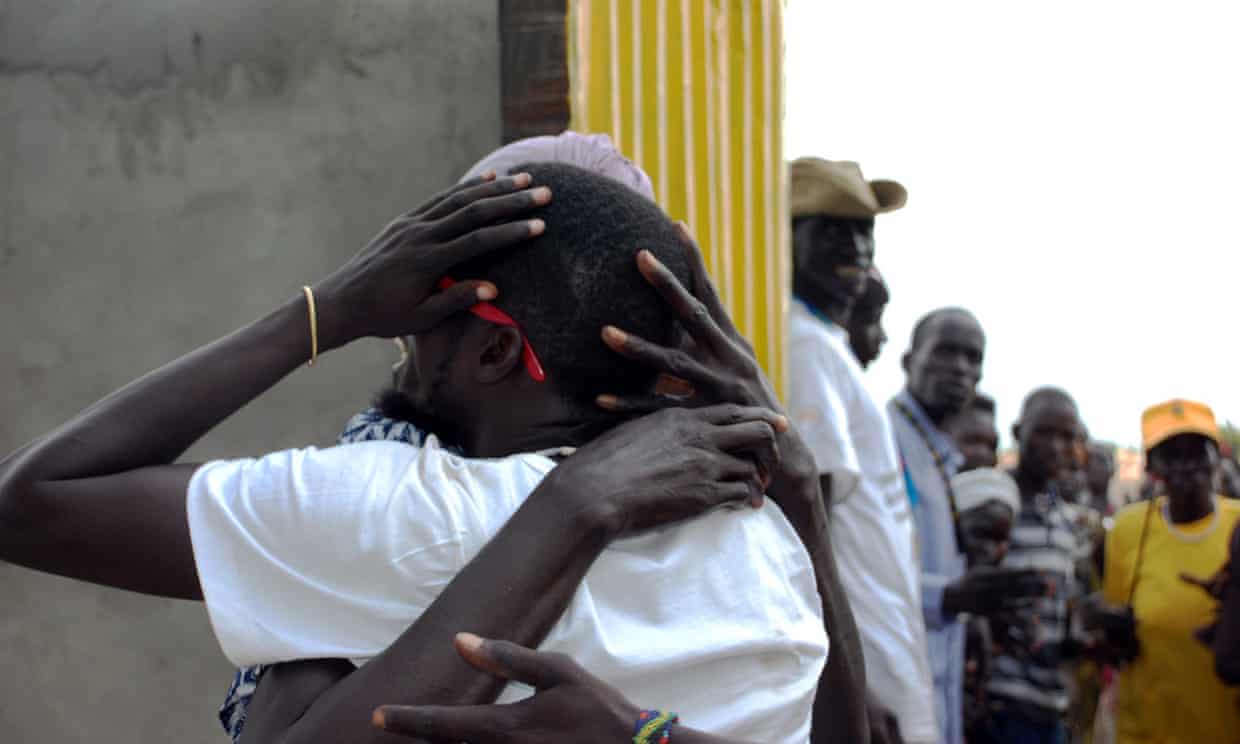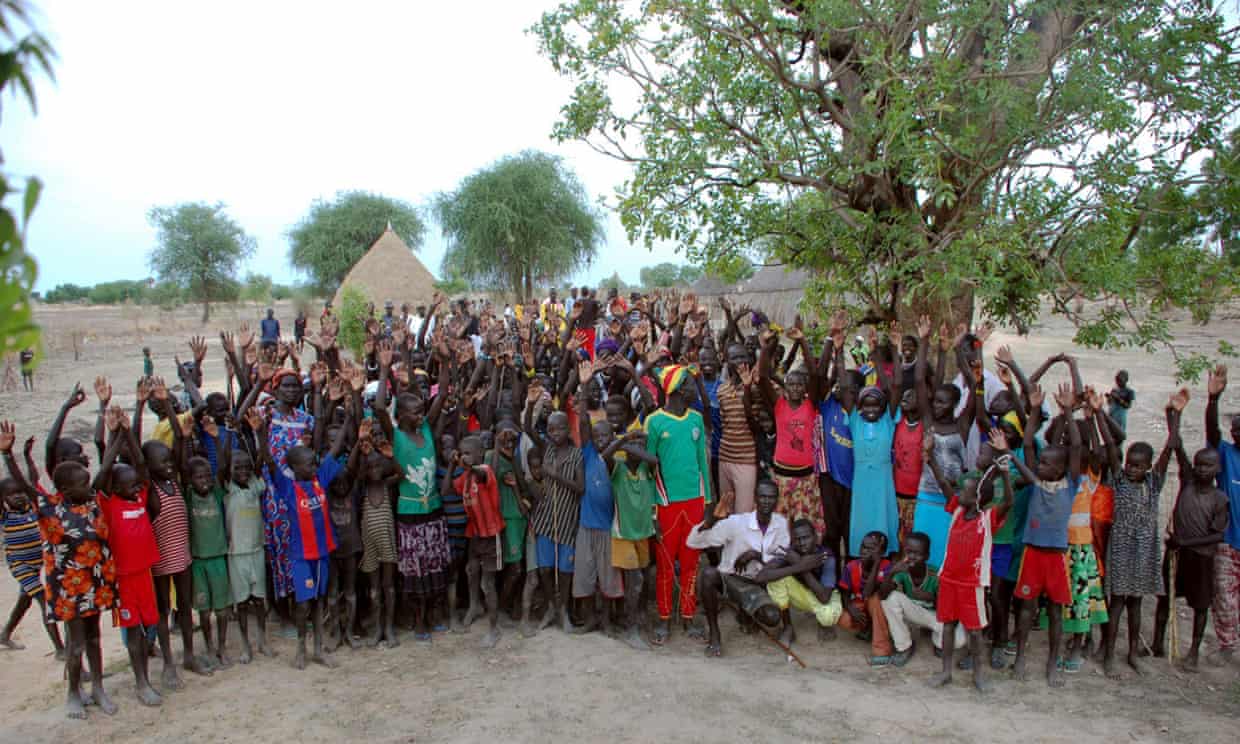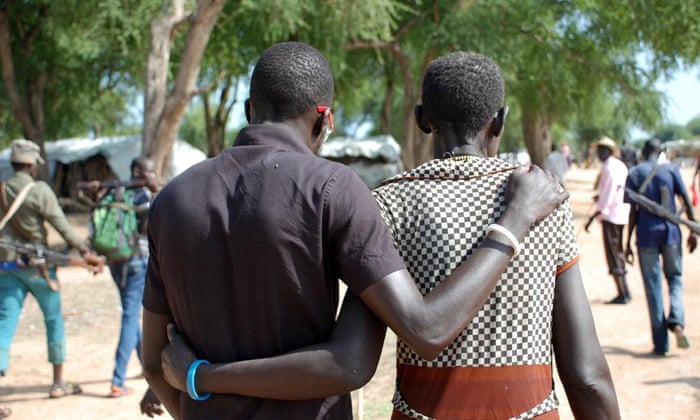As our helicopter descends on Ganyiel – my small, dusty hometown in Unity State, South Sudan – my eyes are glued to the window. I’m nervous. I don’t know what my family looks like. I can’t picture them, but I think I’ll know them.
I left Ganyiel 16 years ago when it was still part of Sudan. The south of my country fought the north in a struggle for freedom lasting decades. The fighting ended – for a while – when the Comprehensive Peace Agreement was signed in 2005. On 9 July 2011, South Sudan was born.
I was one of the lucky ones. In 2000, my uncle had just enough money to send his wife, his child and me – then 12 years old – to Kenya. My first stop was Kakuma refugee camp in the northwest of the country and three days after arriving, I was back in school.
Until now, I’ve never been back to Ganyiel and I’ve missed so many things. I didn’t see my brothers or sisters grow up and I never saw my father again. If I’d stayed, the chances are that I, like many other young men in my country, would have ended up taking part in the fighting. If I’d stayed, there’s a good chance I wouldn’t be here right now.

Instead, I had the opportunity to get an education. I first understood the power of education in 1999 when my elder brother, Kai, died from typhoid. If we’d had good health services, he wouldn’t have died. I realised then that education could give me the power to help my family and my people.
This is what finally brought me back to Ganyiel. I graduated from university in Kenya in 2015 and returned to South Sudan the first chance I had. I now work with Oxfam in Akobo, Jonglei State, just 200 miles from home.
The helicopter lands, the dust settles and the cabin door swings opens. Shielding my eyes from the sun, I peer into the sea of faces gathered on the airstrip. Some I recognise instantly. Others are familiar – from memory or family resemblance – but it takes me a few seconds to place them. It’s a whirlwind of hugs, handshakes and the customary hand on bowed head from my elders.
It’s a few minutes before my eyes meet those of my mother. She strides through the parting crowd and lifts me in the air with a strength I remember from my childhood. “I recognised you at once,” she tells me. “I’d recognise you anytime, anywhere.”
This part of South Sudan has witnessed some of the most intense fighting since a political split in December 2013 shattered the country and the lives of those in it. While a peace agreement was signed in August 2015, its effects have yet to be felt on the ground. Fighting has come as close as Ganyiel’s borders, but has never penetrated local community protection forces.A different violence shattered our family in December 2013, when my father was shot dead just days before the war started. No one was more devastated than my then 14-year-old sister, Nyabuonoak, who was there to witness it. She’s now 17 and happily married. “I would have really wanted, if I were free, just to go to school,” she tells me.

My brother, Thuok, feels the same. Although he’s now 21, he still looks like a boy but his experiences have made him a man. “We took on responsibilities at a young age. We grew up fast. We didn’t know things would change, that we would struggle.”
As the days go on, my happiness turns to worry. I feel the weight of responsibility on my shoulders. Right now, my younger siblings live in a village two hours and a canoe ride away from Ganyiel. I want to build homes for them in Ganyiel town so they can go to the schools nearby. I also want to start a master’s degree. But I’ll have to do it through distance learning so I can keep working and supporting my family.
As I watch my brothers and sisters talk, laugh and tease one another, I wonder about where they would be, and where South Sudan would be, if everyone had access to the same opportunities. Where would my sister’s brightness have taken her? Could my brother have led Ganyiel, even South Sudan, to a better future?
I want the power to change the lives of others, as my uncle changed mine. I want to help my brothers and sisters see a better South Sudan, where opportunities for all doesn’t have to be a dream. When, I wonder, will it be a reality?
Kujiek Ruot Kuajien is a monitoring, evaluation, accountability and learning officer for Oxfam in South Sudan.
